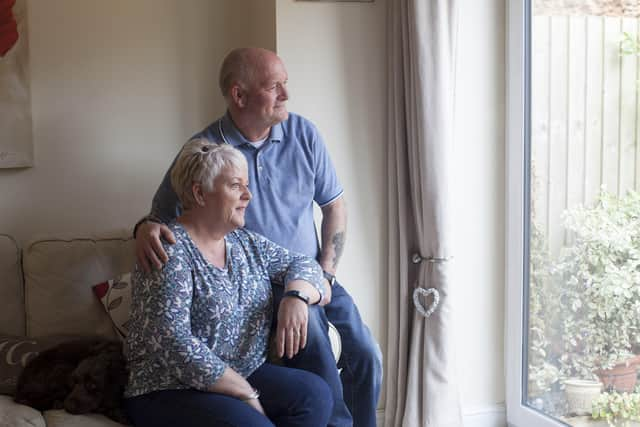Eastbourne woman with dementia reveals the toll lockdown has taken
and live on Freeview channel 276
Christine Maddocks is among those experiencing crippling loneliness and struggling to cope during the covid-19 pandemic.
She said, “I am certainly more depressed, I am more anxious, and – according to some – more irritable.
Advertisement
Hide AdAdvertisement
Hide Ad“People with dementia won’t be able to do things after this that they can now because their dementia will get bad quickly when they can’t do things for themselves.”


Christine, who lives with her partner, said, “Lots of people with dementia I know are more worried about their dementia getting worse than about coronavirus. “People are feeling hopeless and helpless. People have said the thing that kept my dementia at bay was doing things.
“I’m worried for the future. I am worried I might lose the skills I have. When this is over, will I be able to drive?
“Will I still be able to travel? Will I be able to shop? I have to stay indoors because of another health condition, and I really notice the difference.”
Advertisement
Hide AdAdvertisement
Hide AdAlzheimer’s Society is a charity helping to alleviate the anxiety many face by making thousands of ‘welfare calls’ to provide support and information.
In the South East more than 2,600 calls have already been made by staff and volunteers determined to reach out to those in need.
However, the charity’s funds have been badly hit by the pandemic, meaning it now faces a potential drop of £45 million in income.
This comes at a time when demand for its services has skyrocketed, leading it to launch an Emergency Appeal to raise vital funds.
Advertisement
Hide AdAdvertisement
Hide AdFor its latest survey, the charity questioned 880 people either living with dementia or caring for someone with the condition.
More than three quarters (78 per cent) said the coronavirus pandemic has made them feel more lonely or isolated than before, with under half (37 per cent) revealing they feel significantly lonelier and more isolated.
The condition, already the UK’s biggest killer, has been even more deadly during the current pandemic – claiming more lives and leaving many feeling fearful and vulnerable.
Linda O’Sullivan, of the Alzheimer’s Society, said, “Coronavirus has turned life upside down for the thousands of people affected by dementia; many are scared, lonely and struggling to get the help they desperately need.
Advertisement
Hide AdAdvertisement
Hide Ad“During the pandemic, our frontline team has been raising safety alerts, delivering regular welfare calls, and supporting those who have nobody else to turn to through our Dementia Connect support line.
“They have dealt with matters of life and death. But thousands more need help and with Alzheimer’s Society facing a drop of £45 million this financial year due to the pandemic, this lifeline is at risk, which is why we are asking people to donate to our Emergency Appeal.”
Alzheimer’s Society’s Dementia Connect support line has seen more than 7,000 calls in the last two months.
Meanwhile, between March 23 and April 1, when lockdown measures were put in place, the charity says its online support community Talking Point saw a 550 per cent increase in people joining.
Advertisement
Hide AdAdvertisement
Hide AdDonations to Alzheimer’s Society’s Emergency Appeal can be made at alzheimers.org.uk/coronavirus-appeal
The Dementia Connect support line (0333 150 3456) is open seven days a week.
A message from the Editor, Gary Shipton:
In order for us to continue to provide high quality and trusted local news, I am asking you to please purchase a copy of our newspapers.
With the coronavirus lockdown having a major impact on many of our local valued advertisers - and consequently the advertising that we receive - we are more reliant than ever on you helping us to provide you with news and information by buying a copy of our newspapers.
Advertisement
Hide AdAdvertisement
Hide AdOur journalists are highly trained and our content is independently regulated by IPSO to some of the most rigorous standards in the world. But being your eyes and ears comes at a price. So we need your support more than ever to buy our newspapers during this crisis.